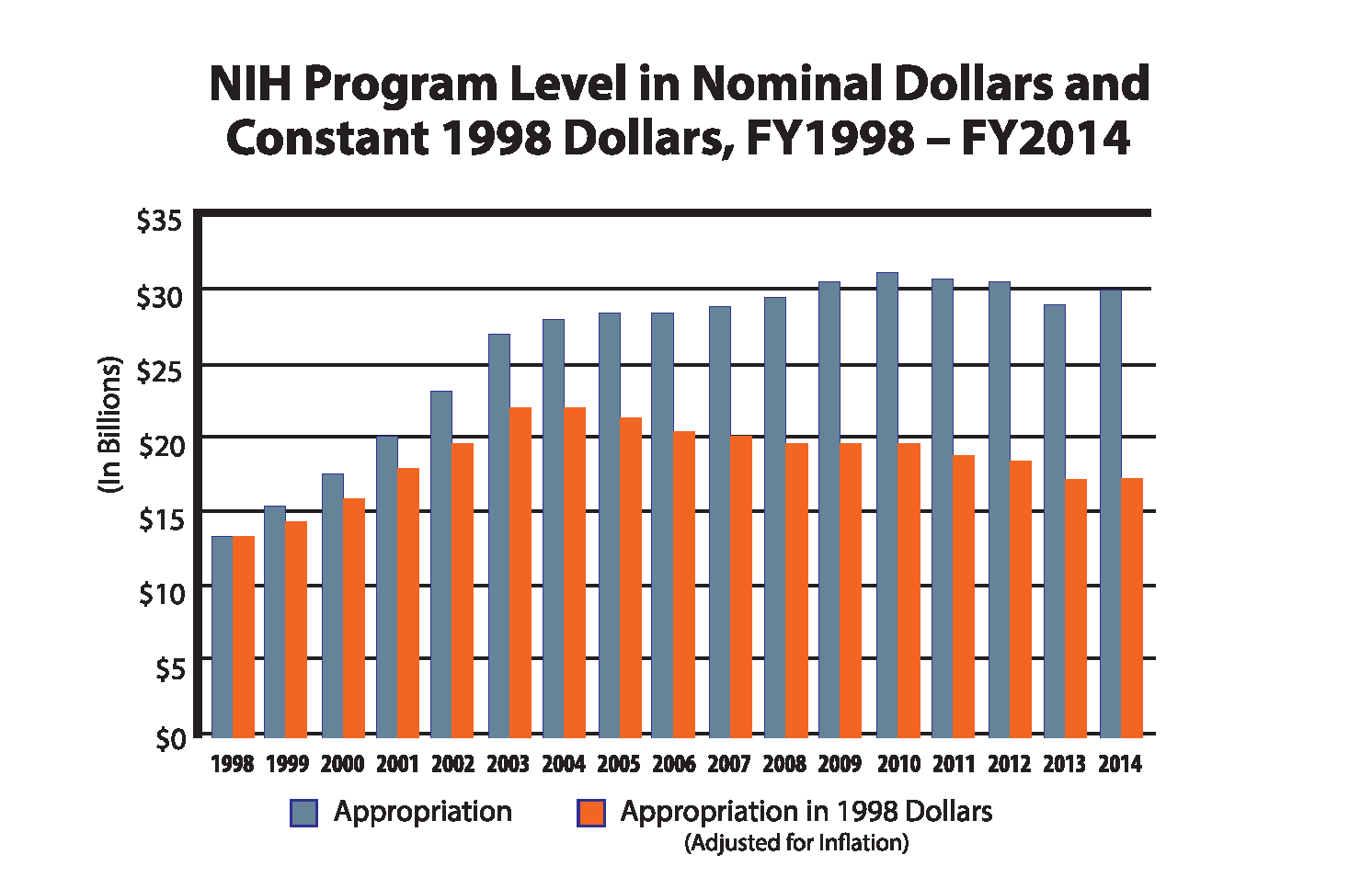In inflation-adjusted dollars, National Institutes of Health (NIH) appropriations are approximately at the same level as 15 years ago.
NIDDK is the National Institute for Diabetes and Digestive and Kidney Diseases, one of 27 NIH Institutes and Centers. The NIDDK conducts and supports basic and applied research. Access the website at www.niddk.nih.gov.
NIH is the focal point for biomedical research in the U.S. NIH conducts research in its own laboratories; supports the research of non-Federal scientists in universities, medical schools, hospitals, and research institutions throughout the country and abroad; helps in the training of research investigators, and fosters communication of medical information. Access the NIH website at www.nih.gov
The State of Research
Stephen P. James, MD, Director, NIDDK Division of Digestive Diseases and Nutrition, was kind enough to join us several times this year to inform our network of healthcare professionals, members of industry, IFFGD advocates, and others about the current state of research related to functional gastrointestinal (GI) and motility disorders at NIH and NIDDK. The following is a summary of what Dr. James shared with us.
Funding at NIH has been challenging, having to deal with the long-term effects of reductions in Federal spending. Although there has been a partial restoration of cuts in the NIH budget, the U.S. continues to trail the developed and developing world by reducing investments in biomedical research. Most of the rest of the world, despite economic challenges, continues to expand their investments in biomedical research.
In inflation adjusted dollars, NIH appropriations are approximately at the same level as 15 years ago. The tremendous momentum gained from the NIH doubling from 1998 to 2003 has been eliminated.

These policy decisions are causing down-sizing or closure of research programs in the U.S., discouraging young people from choosing to enter the long and arduous training pathways that are needed in biomedical research. Reductions in U.S. material and human capital investments threatens U.S. pre-eminent leadership in biomedical research.
Ironically, this is happening at a time when rapid advances in medical research and technology offer the promise of improvement in the lives of people suffering from many chronic diseases. Conditions like chronic hepatitis C infection, heart disease, diabetes, and many forms of cancer and AIDS have benefited.
Progress in developing better diagnostic and treatment approaches for functional GI and motility disorders has been slow. However, due in part to the substantial efforts made by IFFGD, there is increased awareness of the needs of affected individuals and the burdens of illness imposed by these conditions.
NIDDK-funded investigators are making major contributions in the area of basic science discovery helping better understand these conditions. The current NIDDK portfolio spans a broad range of basic and clinical research projects involving tissue and muscle cells, the enteric nervous system (ENS), and mechanistic studies in GERD, dysphagia, and mechanisms of symptom generation, to name a few. The clinical research portfolio includes multi-center studies in gastroparesis, functional dyspepsia, irritable bowel syndrome (IBS), and Sphincter of Oddi dysfunction, among others.
One of the relatively new areas of interest involves understanding the microbiota that we all have in our digestive systems that are believed to play important roles in health and illness. This area is rapidly moving towards therapeutic approaches to improve digestive diseases.
Another exciting area is stem cell research. Tissue models can now easily be made in the laboratory (enteroids) from small endoscopic biopsies of patients to use for study and to lay the foundation for regenerative medicine approaches.
New technologies are opening up ways to better understand how diet is involved in health and illness. NIDDK has contributed to support that focuses on understanding brain gut connections and visceral pain.
NIDDK also recognizes the need to provide specialized infrastructure support for research and supports 16 digestive diseases research core centers and 12 nutrition/obesity research centers around the U.S. In order to help assure a continuing pipeline of new investigators for the future, NIDDK vigorously supports training and career development awards.
Finally, NIDDK devotes substantial effort to educate and inform the public on health issues in digestive diseases and the latest advances that result from NIH research. Extensive online materials for the general public are often developed in partnership with organizations such as IFFGD. The NIDDK continues to support the Bowel Awareness campaign, which was developed with considerable input and assistance from IFFGD, with the aim to provide helpful information to individuals with bowel incontinence.

Stephen P. James, MD, Director,
Division of Digestive Diseases
and Nutrition, NIDDK
Dr. James remains optimistic that, despite current economic challenges, NIDDK will continue to bring improvements to people with functional GI and motility disorders due to the dedication of many scientists around the country, continued funding from the NIH, and the important contribution of professional societies, organizations such as IFFGD, and patients who participate in research projects and inspire us all.













